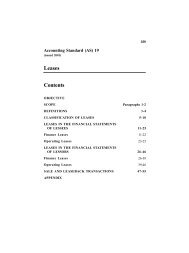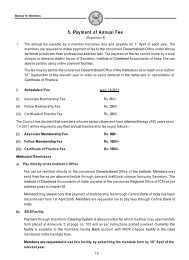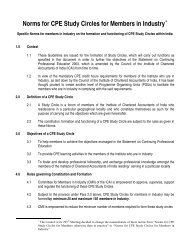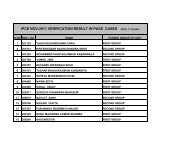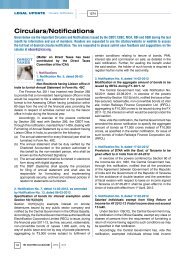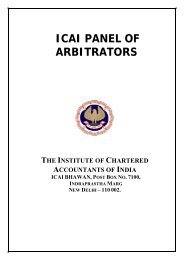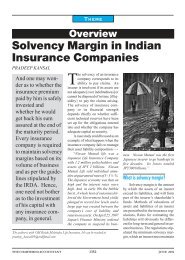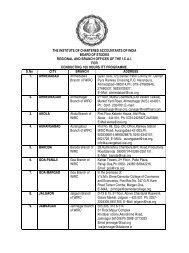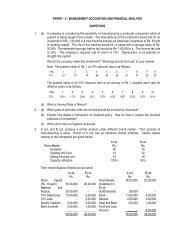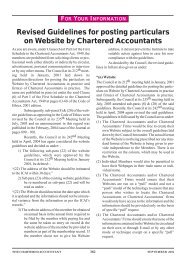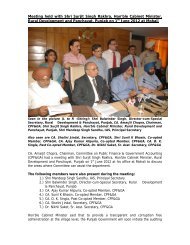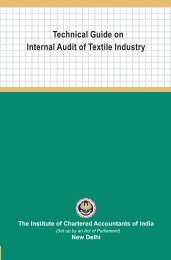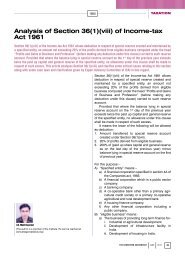The Chartered Accountant
The Chartered Accountant
The Chartered Accountant
Create successful ePaper yourself
Turn your PDF publications into a flip-book with our unique Google optimized e-Paper software.
order shall consider whether the direction for deposit<br />
as pre-deposit condition would cause undue hardship<br />
to the person against whom such direction is issued.<br />
Such a finding is not available in the impugned order<br />
of the respondent, nor did the respondent decide<br />
DECEMBER 2008 1002 THE CHARTERED ACCOUNTANT<br />
LEGAL UPDATE<br />
the prima facie issue. It is not proper on the part of<br />
the respondent to come to the prima facie conclusion<br />
that the petitioner is liable to pay tax for all the works<br />
as assessed by the original authority.<br />
<strong>The</strong> petition was disposed of.<br />
Sales Tax / VAT<br />
Rule 31B of the Bombay Sales Tax Rules, 1959 — Incentives — Entitlement<br />
An existing unit is entitled to the incentives under the 1993 scheme irrespective of the increase in the<br />
production capacity<br />
Commissioner of Sales Tax, Mumbai v. Pec Vee Textile Limited, Wardha (BOM), 13 October 2008<br />
<strong>The</strong> issue under consideration is whether the Deputy<br />
Commissioner of Sales Tax could impose conditions<br />
to the effect that the incentives can be availed proportionately<br />
to the production of the finished products<br />
attributable to the newly acquired fixed assets?<br />
<strong>The</strong> High Court held that the 1993 scheme as amended<br />
in 1994 makes a specific departure from the earlier<br />
schemes and provides for availing the incentives not<br />
on the proportionate basis but on the total production<br />
of the Existing Unit. In these circumstances, imposing<br />
conditions for availing the incentives on prorata basis<br />
would be contrary to the 1993 scheme of incentives.<br />
<strong>The</strong>refore, additional investment made by the assessee<br />
for modernisation and upgradation of the existing<br />
plant did not result in increase in the production<br />
capacity of the plant. Merely because an existing unit<br />
is entitled to the incentives on acquisition of requisite<br />
new fixed assets and merely because the incentives are<br />
to be availed on the finished products, it cannot be<br />
presumed that the incentives under the 1993 scheme<br />
are to be availed on the finished products attributable<br />
to the fixed assets newly acquired by the existing unit.<br />
Since increase in the production capacity of the existing<br />
unit acquiring new fixed assets, is not the criteria<br />
for entitlement of incentives under the 1993 scheme,<br />
availing the incentives under the 1993 scheme proportionate<br />
to the production attributable to the newly acquired<br />
fixed assets does not arise at all. Rule 31B does<br />
not provide for availing the incentives under the 1993<br />
scheme in proportion to the production attributable<br />
to the newly acquired fixed assets. An existing unit is<br />
entitled to the incentives under the 1993 scheme irrespective<br />
of the increase in the production capacity.<br />
<strong>The</strong> applications were disposed of.<br />
Other Acts<br />
Arbitration Act<br />
Section 11 of the Arbitration and Conciliation Act, 1996 — Appointment of Arbitrator<br />
Where conditions indicate to existence of an arbitration agreement, matter should be referred to an Arbitrator<br />
M/s. Unissi (India) Pvt. Ltd. v. Post Graduate Institute of Medical Education & Research (Supreme Court), 1 Octo-<br />
ber, 2008<br />
Tender floated by the Respondent/PGI contained<br />
an arbitration clause. <strong>The</strong> appellant gave an offer<br />
for the tender which was accepted by the Respondent.<br />
Purchase orders were placed and in compliance<br />
with the said order, the appellant had supplied<br />
equipments. <strong>The</strong> delivery of equipments was also accepted<br />
by the Respondent and the machineries were<br />
installed however, no payment was made to the appellant.<br />
<strong>The</strong> Respondent demanded the execution<br />
of an agreement containing an arbitration clause on<br />
a non-judicial stamp paper duly signed. <strong>The</strong> appellant<br />
signed the agreement and sent it to the Respondent.<br />
<strong>The</strong> Respondent though admittedly received the<br />
same, did not send back the agreement to the appellant.<br />
It was alleged by the Respondent that no arbitration<br />
agreement was executed between the parties<br />
and, therefore, question of appointing an Arbitrator<br />
could not arise. <strong>The</strong> Additional District Judge held<br />
that it could not be held that the appellant was entitled<br />
to ask for appointment of an Arbitrator under<br />
Section 11.<br />
<strong>The</strong> High Court held that the tender documents itself<br />
contain an arbitration clause and by reason of acceptance<br />
of the tender of the appellant by PGI, it must<br />
be held that there was a valid arbitration agreement between<br />
the parties.<br />
Further, although no formal agreement was executed,<br />
the tender documents indicating certain conditions of<br />
contract contained an arbitration clause. Since, an arbitration<br />
agreement did exist in the instant case, the<br />
matter should be referred to an Arbitrator for decision.<br />
Accordingly order passed by the Learned District<br />
Judge was set aside.<br />
<strong>The</strong> appeal was allowed.



